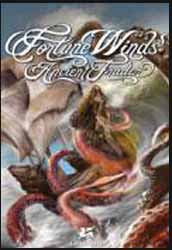|
Click here to return to the main site. PC Game Review
Fortune Winds: Ancient Trader is a new turn based strategy game from Legendo Entertainment, based on sixteenth century seafaring trade. The first thing you notice is the look of the game which has drawn its inspiration from Abraham Ortelius maps, the co-creator of the first atlas. Though, like Spielberg’s Schindler's List's black and white, we mostly remember the maps not in their pristine condition, but sepia aged, like they had been dipped in vinegar. The graphics not only ape the colour of the maps, but also their stylistic look. The game takes place on a part of the ocean which consists mainly of islands, although at the start of the game much of this is hidden in the fog of war. Only by moving around will you uncover the rest of the map. Alongside islands, which are good for trade and upgrading your galleon, the seas have chests of gold to discover and beasts to fight. The combat is based around rock-paper-scissors and takes a little getting used to, but once you get the idea it’s fairly simple. You can also take on the other AI players to gain advantages in trade and quests. Each game starts with a central quest and side quests can be picked up from the island ports. The winner is the first to complete the quests. As well as being turn based, the distance which you can travel is limited per turn; therefore you have to make the decision whether to go after chests or trade. There are three goods to trade between ports, but there is a problem, unless you have a good memory, the trading screen obscures the main screen, which means that you’ll find it difficult to compare prices in your current port with those on the rest of the board. As well as a single person game Fortune Winds also has the option for between one and four people to play together. The shared, turn based option, may seem a little odd at first look, the idea of four people crowding around a PC taking turns seems somewhat claustrophobic until you take into account the amount of high definition televisions which are invading living rooms. Hooked up to one of these the option makes a lot more sense, akin to a digital board game. The relative shortness of the individual games means that it could conceivably appeal to the family pick up and play market. The game has a lot to offer, but its main problem is its longevity. Trade routes are fairly easy to work out; even though the prices vary, and once you’ve worked out a pattern it’s pretty easy to beat the game. The game feels stronger as a shared experience where the unpredictability of other players can be a factor. 7 Charles Packer |
|---|
